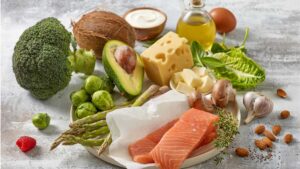Welcome to our in-depth exploration of the crucial role that healthy fats play in a successful keto diet. While many people mistakenly believe that all fats are detrimental to their health, the ketogenic diet emphasizes the consumption of specific types of fats that promote overall well-being and support the body’s transition into a state of ketosis. In this article, we’ll delve into the science behind healthy fats, their benefits for weight loss and metabolic health, and provide practical examples of incorporating them into your daily meals. So, let’s dive in and discover the power of healthy fats on your keto journey.
Unveiling the Truth About Fats
Fats are categorized into saturated, monounsaturated, polyunsaturated, and trans fats. Each type has different properties and effects on our health. Healthy fats, such as monounsaturated and polyunsaturated fats, are essential for proper cellular function, hormone production, and nutrient absorption. Contrary to popular belief, dietary fat is not the enemy. It’s the quality and quantity of fats that matter most.
Embracing Fat as Your Primary Energy Source
The ketogenic diet is designed to shift the body’s metabolism into a state of ketosis, where fats are used as the primary fuel source instead of carbohydrates. Consuming high amounts of healthy fats prompts the body to become fat-adapted, meaning it becomes efficient at utilizing fats for energy production.
When the body is in ketosis, it produces ketones, which are byproducts of fat metabolism. Ketones provide a steady supply of energy to the brain and body.
Fueling Your Body and Enhancing Your Health
- Weight loss and satiety: Healthy fats promote feelings of fullness and reduce cravings, making it easier to adhere to a calorie-restricted diet and achieve weight loss goals.
- Improved insulin sensitivity: Consuming healthy fats can enhance insulin sensitivity, leading to better blood sugar control and reduced risk of insulin resistance and type 2 diabetes.
- Heart health: Contrary to common misconceptions, research suggests that a diet rich in healthy fats can improve heart health markers, including blood lipid profiles and inflammation markers.
Delicious and Nutrient-Dense Fat Sources

Avocado
Rich in monounsaturated fats, avocados can be sliced, mashed, or used as a base for keto-friendly dips and spreads.
Olive oil
This heart-healthy oil is ideal for salad dressings, sautéing vegetables, or drizzling over cooked meats and fish.
Coconut oil
Packed with medium-chain triglycerides (MCTs), coconut oil is a popular choice for cooking, baking, and adding a creamy texture to smoothies and keto desserts.
Fatty fish
Salmon, mackerel, and sardines are excellent sources of omega-3 fatty acids, which have been shown to reduce inflammation and support brain health.
Nuts and seeds
Almonds, walnuts, chia seeds, and flaxseeds are rich in healthy fats and make convenient and nutritious keto-friendly snacks.
Grass-fed butter and ghee
These dairy products provide a rich source of saturated fats and add flavor to cooked dishes and bulletproof coffee.
Finding the Right Balance for Your Keto Journey
Understanding macros
The ketogenic diet requires careful attention to macronutrient ratios, with a focus on high fat, moderate protein, and low carbohydrate intake.
Calculating your macros
Use online calculators or consult with a healthcare professional to determine your personalized macronutrient needs based on your goals, activity level, and body composition.
Monitoring portion sizes
While healthy fats are beneficial, they are calorie-dense. It’s important to be mindful of portion sizes to maintain a calorie deficit for weight loss or a calorie balance for maintenance.
Tracking your intake
Utilize apps or journals to track your food intake and ensure you’re meeting your fat goals while staying within your overall calorie limits.
From Breakfast to Dinner, Delicious Fat-Filled Delights
Breakfast
Enjoy a fluffy omelet cooked in coconut oil, filled with sautéed vegetables and topped with sliced avocado and a sprinkle of feta cheese.
Lunch
Savor a refreshing salad with mixed greens, grilled chicken, cherry tomatoes, cucumber, and a drizzle of extra virgin olive oil and balsamic vinegar.
Snack
Dip celery sticks into almond butter or snack on a handful of macadamia nuts for a satisfying and nutrient-dense snack.
Dinner
Indulge in a juicy ribeye steak cooked in grass-fed butter, accompanied by roasted Brussels sprouts tossed in avocado oil and sprinkled with Parmesan cheese.
Opting for High-Quality Fats for Optimal Health
Organic and grass-fed
Whenever possible, choose organic and grass-fed sources of animal fats, such as butter and ghee, to minimize exposure to harmful chemicals and maximize nutrient content.
Cold-pressed oils
Opt for cold-pressed oils, like extra virgin olive oil and unrefined coconut oil, as they retain more nutrients and beneficial compounds compared to their refined counterparts.
Avoiding trans fats
Steer clear of foods containing trans fats, commonly found in processed and fried foods, as they are linked to increased inflammation and cardiovascular risks.
Conclusion
As you embark on your keto journey, remember that healthy fats are not only allowed but essential for your success. By embracing the right types and sources of fats, you’ll fuel your body, support your metabolism, and optimize your health. Experiment with a variety of delicious fat-filled meals and snacks to find what works best for you. Keep in mind the importance of portion control and tracking your macros to maintain a balanced and sustainable approach. Embrace the power of healthy fats, and enjoy the numerous benefits they bring to your keto lifestyle. Here’s to a successful and fat-fueled journey!









